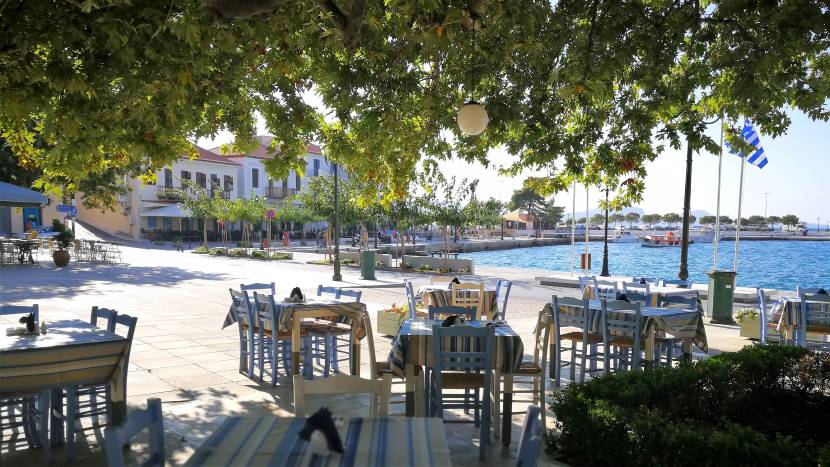Greece Leads the Way in Sustainable Tourism: Personalised Travel Adventures Across Its Untouched Landscapes – Travel And Tour World

Report on Greece’s Strategic Shift Towards Sustainable and Personalised Tourism
Introduction: A New Paradigm for Greek Tourism
The Hellenic Republic is undertaking a significant transformation of its national tourism strategy, moving away from a model of mass tourism towards a framework centered on sustainability, personalisation, and environmental stewardship. This strategic pivot is designed to diversify the country’s tourism offerings, protect its natural and cultural heritage, and align its tourism sector with the United Nations Sustainable Development Goals (SDGs). The initiative promotes bespoke travel experiences in lesser-known regions, aiming to create a more resilient and equitable tourism economy that benefits local communities and preserves pristine landscapes for future generations.
Alignment with Sustainable Development Goals (SDGs)
Greece’s new tourism model is fundamentally linked to the 2030 Agenda for Sustainable Development. The strategy incorporates principles that directly contribute to several key SDGs, positioning the nation as a leader in responsible travel.
SDG 8: Decent Work and Economic Growth
The strategy actively supports SDG 8 by diversifying the tourism economy and fostering inclusive growth.
- Local Economic Development: By promoting off-the-beaten-path destinations such as Northern Greece, Crete’s rural villages, and the Peloponnese, the initiative stimulates job creation and economic opportunities in communities previously excluded from mainstream tourism revenue.
- Support for Small Enterprises: The focus on authentic experiences, including culinary tours and community-run activities, empowers local entrepreneurs and small-scale businesses, ensuring a more equitable distribution of tourism benefits.
SDG 11: Sustainable Cities and Communities
The initiative addresses the challenges of over-tourism and promotes the preservation of cultural assets, in line with SDG 11.
- Preservation of Cultural Heritage: By encouraging travel to a wider range of locations, the strategy reduces pressure on iconic but overcrowded sites like Santorini and Mykonos, helping to protect and manage cultural heritage sustainably.
- Community Engagement: The model promotes tourism that respects and supports local traditions and lifestyles, fostering a positive relationship between visitors and host communities.
SDG 12: Responsible Consumption and Production
A core component of the transformation is the adoption of sustainable practices across the tourism value chain, directly addressing SDG 12.
- Sustainable Operations: Encouraging hotels and resorts to implement energy-efficient systems and waste reduction measures promotes sustainable consumption and production patterns.
- Partnership for Sustainability: The collaboration with the Global Sustainable Tourism Council (GSTC) establishes a national standard for eco-friendly practices, ensuring that tourism operations are managed responsibly.
SDGs 13, 14, and 15: Climate Action and Environmental Protection
The emphasis on environmental preservation is a cornerstone of the new policy, contributing to climate action and the conservation of ecosystems.
- Low-Impact Mobility: The introduction of green transport options, such as electric vehicles and bike tours, helps reduce the carbon footprint of tourism, contributing to SDG 13 (Climate Action).
- Conservation of Natural Landscapes: By promoting responsible exploration of natural sites like the Samaria Gorge and Mount Olympus, the strategy supports the conservation of terrestrial and marine ecosystems, aligning with SDG 14 (Life Below Water) and SDG 15 (Life on Land).
Key Strategic Initiatives
Implementation of Sustainable Tourism Practices
Greece is operationalising its commitment to sustainability through a series of targeted initiatives:
- Sustainable Accommodations: A nationwide push for hotels to adopt low-impact measures, including energy efficiency and waste management protocols.
- Responsible Tourism Experiences: Promotion of local, authentic activities that provide direct economic support to communities and safeguard cultural sites.
- Green Transportation Infrastructure: Investment in and promotion of eco-friendly mobility solutions to minimise the environmental impact of travel within the country.
Development of Personalised and Bespoke Travel
To meet the demand for more meaningful travel, Greece has developed platforms and services that empower visitors to create unique itineraries.
- Digital Self-Booking Platforms: The Visit Greece portal and associated tools allow travellers to design customised routes that integrate mainland and island destinations seamlessly.
- Expert Consultation Services: Availability of local travel experts to craft personalised itineraries based on individual interests, catering to solo travellers, small groups, and niche markets.
- Flexible Travel Options: An emphasis on providing intimate and adaptable travel packages that move beyond the constraints of traditional mass-market tours.
Conclusion: A Forward-Thinking Vision for Global Tourism
Greece’s strategic reorientation of its tourism sector represents a comprehensive commitment to sustainability, economic resilience, and cultural preservation. By embedding the Sustainable Development Goals into its core tourism policy, the nation is not only enhancing the visitor experience but also establishing a new global standard for responsible travel. This forward-thinking approach ensures the long-term viability of its tourism industry while protecting the invaluable natural and cultural assets that define the country. The result is a more enriching and impactful travel experience that benefits both the visitor and the host destination.
Analysis of Sustainable Development Goals in the Article
1. Which SDGs are addressed or connected to the issues highlighted in the article?
The article on Greece’s new tourism strategy connects to several Sustainable Development Goals (SDGs) by focusing on environmental protection, economic benefits for local communities, and the preservation of cultural heritage.
-
SDG 8: Decent Work and Economic Growth
The article highlights Greece’s initiative to diversify its tourism sector by promoting lesser-known destinations and authentic local experiences. This strategy aims to create economic opportunities and jobs in rural and remote areas, such as “Crete’s rural villages” and the “Peloponnese,” thereby supporting inclusive and sustainable economic growth that benefits local communities directly.
-
SDG 11: Sustainable Cities and Communities
The focus on safeguarding Greece’s heritage is a central theme. The strategy encourages tourism that respects and protects “cultural sites” and the country’s “rich heritage.” By moving tourists away from overcrowded hubs to “lesser-known spots,” the initiative helps preserve the cultural and natural integrity of popular destinations while promoting the unique character of others.
-
SDG 12: Responsible Consumption and Production
This is the most prominent SDG in the article. Greece’s shift towards “sustainable tourism” and “eco-conscious travel” directly addresses the need for sustainable consumption and production patterns. The article details specific actions like promoting “sustainable accommodations,” implementing “low-impact measures like energy-efficient systems and waste reduction,” and introducing “green transport options,” all of which are core components of this goal.
-
SDG 17: Partnerships for the Goals
The article explicitly mentions a key partnership to achieve its sustainability objectives. The collaboration between the “Greek government” and the “Global Sustainable Tourism Council (GSTC)” is a clear example of a multi-stakeholder partnership aimed at implementing global sustainability standards within the national tourism industry.
2. What specific targets under those SDGs can be identified based on the article’s content?
Based on the initiatives described, several specific SDG targets can be identified:
-
Target 8.9: Promote sustainable tourism
The article’s entire premise is built around this target. It states that Greece’s goal is to “promote sustainable tourism” and create “authentic experiences that benefit both visitors and local communities.” The focus on local culture, such as a “culinary tour in Peloponnese” or “community-run eco-tourism activities in Thessaloniki,” directly aligns with the target’s aim to create jobs and promote local products and culture.
-
Target 11.4: Protect the world’s cultural and natural heritage
The strategy to encourage visitors to explore “lesser-known spots that showcase the country’s rich heritage” and to protect “cultural sites” is a direct effort to safeguard cultural heritage. Furthermore, the emphasis on preserving “untouched landscapes” and “pristine landscapes” like the “Samaria Gorge” and “Mount Olympus” addresses the natural heritage component of this target.
-
Target 12.b: Monitor sustainable tourism impacts
The partnership with the “Global Sustainable Tourism Council (GSTC)” is a strategic move to “incorporate eco-friendly practices into tourism operations across the country” and align with “global standards.” This implies the development and implementation of tools to monitor the impacts of tourism, which is the core of Target 12.b.
-
Target 17.17: Encourage effective partnerships
The article provides a concrete example of this target through the formal collaboration between a public entity (the “Greek government”) and a global civil society organization (the “GSTC”). This partnership is designed to leverage expertise and resources to advance the shared goal of sustainable tourism.
3. Are there any indicators mentioned or implied in the article that can be used to measure progress towards the identified targets?
The article implies several qualitative and activity-based indicators that can be used to measure progress:
-
Indicators for Target 8.9 & 12.b
- Development of a national sustainable tourism strategy: The article describes the launch of a “nationwide initiative to support sustainable tourism practices” by the Ministry of Tourism.
- Number of sustainable tourism offerings: The promotion of specific experiences like “nature trek through Samaria Gorge,” “community-run eco-tourism activities,” and stays at “eco-conscious resorts in Zante” serve as indicators of the diversification of the tourism product.
- Adoption of sustainable practices by businesses: The encouragement for hotels to implement “energy-efficient systems and waste reduction” is a measurable indicator of industry adoption.
- Availability of sustainable transport: The introduction of “electric vehicles and bike tours” is a specific indicator of progress in green mobility for tourists.
-
Indicators for Target 11.4
- Policies to manage tourist flows: The strategy to divert tourists from crowded hubs to “off-the-beaten-path destinations” is an indicator of efforts to protect heritage sites from over-tourism.
-
Indicators for Target 17.17
- Existence of formal partnerships: The established collaboration between the “Greek government and the Global Sustainable Tourism Council (GSTC)” is a direct indicator of a partnership for sustainable development.
4. Table of SDGs, Targets, and Indicators
| SDGs | Targets | Indicators Identified in the Article |
|---|---|---|
| SDG 8: Decent Work and Economic Growth | Target 8.9: By 2030, devise and implement policies to promote sustainable tourism that creates jobs and promotes local culture and products. |
|
| SDG 11: Sustainable Cities and Communities | Target 11.4: Strengthen efforts to protect and safeguard the world’s cultural and natural heritage. |
|
| SDG 12: Responsible Consumption and Production | Target 12.b: Develop and implement tools to monitor sustainable development impacts for sustainable tourism. |
|
| SDG 17: Partnerships for the Goals | Target 17.17: Encourage and promote effective public, public-private and civil society partnerships. |
|
Source: travelandtourworld.com
What is Your Reaction?
 Like
0
Like
0
 Dislike
0
Dislike
0
 Love
0
Love
0
 Funny
0
Funny
0
 Angry
0
Angry
0
 Sad
0
Sad
0
 Wow
0
Wow
0














































































